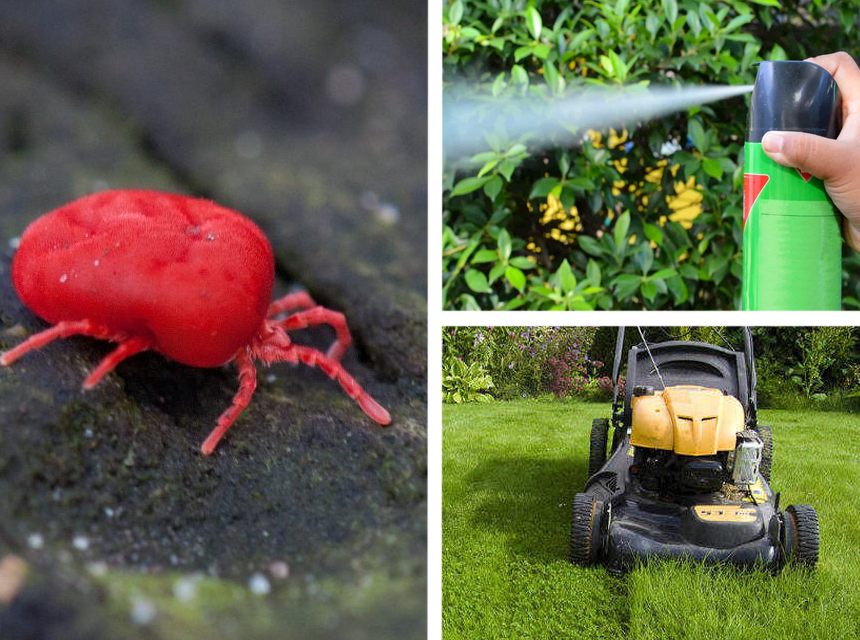

Chiggers are like petty triggers that can trigger nauseating discomfort. If you don’t know how to get rid of chiggers, you will experience pain from their bites. These chiggers are little mites who enjoy hanging around damp spots underneath trees, weed patches, and tall grass.
Homeowners are always looking for ways to get rid of chiggers in their yards because the backyard is usually their favorite spot. It’s important you learn how to get rid of chiggers on your porch and your other home areas because of the health inconveniences they pose. You can go on days treating their itchy bites. If you don’t know how to get rid of chiggers bites as fast as possible, the discomfort you’ll experience may only be prolonged. In this article, you’ll learn everything you need to know about chiggers and how to exterminate them.
Chiggers belong to the Trombiculidae family, and they’re the larvae of a particular kind of mite. Mower’s mites, harvest mites, harvest lice, and red bugs are other names that have been given to them.
It’s very difficult to see these little bugs with your naked eyes. They’re microscopic and share a close relationship with ticks and spiders. This makes them “arachnids” and not insects per se.
It’s impossible to escape from these pests because you’ll find them anywhere you go. They’re global, and they exude more energy when temperatures are hot during the summer months. They love to be outdoors, especially around streams, lakes, lawns, forests, fields, and other moist, grassy areas.
It’s the environment that attracts chiggers the most. These bugs will gladly take over shady and vegetation areas.
Thickets, swamp areas, woodlands, and grassy areas are their most loved abodes.
The condition of these environments provides them with a relaxing base and opportunities to target any person or animal that passes. If you live in a place like Florida, these pests can be active year-round. They love a warm and humid environment.
Chiggers are extremely small kinds of arachnids. It’s almost impossible to see them because they’re super small. They’re as small as 1/120 to 1/150 of an inch, and they’re usually red. You may observe them move, but they’ll appear like dust particles. Their red color also sells them out sometimes and may give you a clue that you’re dealing with chiggers.
Given that chiggers are tiny, it’s difficult to indicate their infestation. However, one way to be aware of their infestation is if people around your home or your pets start developing infuriating itchy bites , and they can’t spot the insect behind it.
These chiggers explore the low-growing vegetation around them to position themselves strategically. Once they spot any human, birds, reptiles, rodents, dogs, or cats, they’ll attack.
They’ll attach themselves to the host’s skin and produce a liquid on the skin cells of the host. This liquid, which is saliva, contains digestive enzymes. It can make the victim experience rash and profound itching.
However, this itching doesn’t start immediately. The chiggers would have done their attachment to the skin. It’s about three to six hours later that you’ll start feeling itchy. If you’ve been walking in tall brush, your waistline areas can be the targeted area. Spots around the ankles can also be where you may be bitten.
For at least three days, these chiggers can stay on their host’s skin if they’re not removed.
If you don’t know how to get rid of chiggers on your skin or how to get rid of chiggers on your dogs, you’ll only be given more days to feed. Whereas they’ll even drop off once they’re done sucking. Chiggers do the most when they’re larvae. They lose the capacity to prey on hosts when they become nymphs and adults.
Chiggers are unpleasant pests. Even though their bites are not proven dangerous, the itchy welts they leave can be quite discomforting. Your skin can become vulnerable to secondary infections if you start scratching intensely. From knowing how to get rid of chiggers outside to how to get rid of chiggers in bed, adequate knowledge of how to get rid of chiggers in your home successfully will make your house more comfortable. And here are three methods you can use;

If you’ve long desired to know how to get rid of chiggers naturally, this is the right method. It costs you almost nothing. The basic thing you’re expected to do is to make your yard less inviting. Since these pests appreciate dense vegetation and moist areas, work on your environment. Mow your lawn regularly. Decrease humidity and encourage more sunlight by pruning the shrubs and trees. Take away piles of debris. And also, keep main hosts like rodents away from your home.
This method is best suitable for gardeners who desire to provide shelter for desirable wildlife, keep their meadow-style beds, and maintain their pollinator gardens. If you don’t want to have everything manicured while controlling chiggers, then take protective measures. Use insect repellent to treat your clothing. Wear long clothes. Whenever you’re working in brush, overgrown areas, and tall grass, keep your protective clothing on. Once you get back indoors, bathe with soap. This is also an effective method to get rid of chiggers nail polish.
The usage of insecticide is effective, but it’s usually not the best solution. However, it’s best effective when you’re certain of a particular spot in your yard that’s their hot spot. What makes the use of insecticides a less favorable option is that they can kill beneficial insects too. Sometimes, wrong applications can also create another unpleasant issue. If you must spray insecticides, ensure you don’t spray the whole lawn or yard.
Although chiggers usually target areas like the groin, waist, behind your knees, lower legs, and ankles, they can bite any part of your exposed body. You’ll start itching a few hours after you’re bitten. This itching can be so inconvenient that it can make sleeping difficult, and it can go on for days. You’re also likely to develop a hive-like rash, blisters, or bumps that wouldn’t heal for days. If your penis gets bitten by these chiggers, you may suffer “summer penile syndrome” with symptoms like difficulty in peeing, itchiness, and swelling.
Chiggers can provoke unpleasant infections and irritations, even though they don’t spread diseases. If you’re in a place like northern Australia, India, Japan, China, Indonesia, or Southeast Asia, you must be very careful with chiggers because bites from the infected ones can cause scrub typhus.
You may be looking for how to get rid of chiggers on concrete, but knowing how to treat chigger bites is also valuable. Moving on, do a complete body check if you sense you might have come across chiggers. There’s a possibility that you’ll see your skin attached to some tiny red dots. You may also see these dots moving very rapidly on you.
The first thing you should do is to use soap and water to scrub your skin as you shower. This will wash off all chiggers.
Your towels, blankets, or other clothes that may have come in contact with these chiggers should be washed with hot water. Now, you can use an ointment such as hydrocortisone, calamine lotion, or menthol. Or, get an anti-itch cream to treat your bites. You can also use a cold compress or take antihistamine pills to feel more relieved.
You usually don’t need to do anything before these bites get better. With time, they improve without using anything. Nevertheless, you may consider seeing your doctor if these bites disturb you for too long. There are some rare situations where the swelling or the itching will demand steroid shots. If these bites become infected, you may be demanded to use prescribed antibiotics by your doctor.
Chiggers are the last pests you’ll ever want in your home. What makes these tiny creatures more difficult to deal with is their invisible nature. If you’re not observant enough, you can spend days carrying them without noticing.
These chiggers can also put your pets through unexplainable pain. This is why you need to know how to eliminate them. With the proper knowledge of how to get rid of chiggers, you can be free from the madding itchiness they cause. And your home can become more welcoming.
Let no chigger trigger you no longer. Take the right steps to eliminate them and enjoy your well-deserved serene environment.